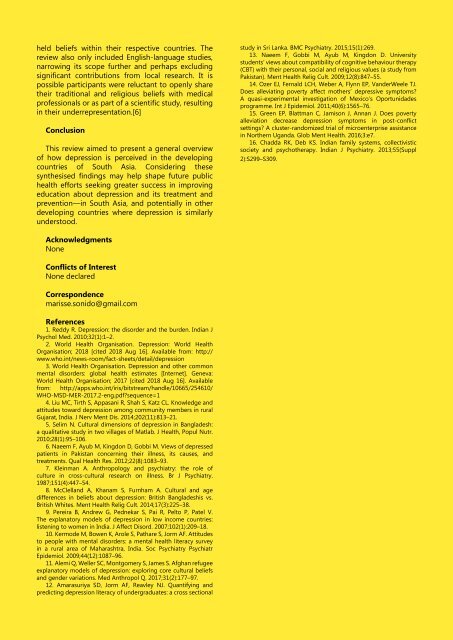Vector Volume 12 Issue 2 - 2018
Create successful ePaper yourself
Turn your PDF publications into a flip-book with our unique Google optimized e-Paper software.
held beliefs within their respective countries. The<br />
review also only included English-language studies,<br />
narrowing its scope further and perhaps excluding<br />
significant contributions from local research. It is<br />
possible participants were reluctant to openly share<br />
their traditional and religious beliefs with medical<br />
professionals or as part of a scientific study, resulting<br />
in their underrepresentation.[6]<br />
Conclusion<br />
This review aimed to present a general overview<br />
of how depression is perceived in the developing<br />
countries of South Asia. Considering these<br />
synthesised findings may help shape future public<br />
health efforts seeking greater success in improving<br />
education about depression and its treatment and<br />
prevention—in South Asia, and potentially in other<br />
developing countries where depression is similarly<br />
understood.<br />
study in Sri Lanka. BMC Psychiatry. 2015;15(1):269.<br />
13. Naeem F, Gobbi M, Ayub M, Kingdon D. University<br />
students’ views about compatibility of cognitive behaviour therapy<br />
(CBT) with their personal, social and religious values (a study from<br />
Pakistan). Ment Health Relig Cult. 2009;<strong>12</strong>(8):847–55.<br />
14. Ozer EJ, Fernald LCH, Weber A, Flynn EP, VanderWeele TJ.<br />
Does alleviating poverty affect mothers’ depressive symptoms?<br />
A quasi-experimental investigation of Mexico’s Oportunidades<br />
programme. Int J Epidemiol. 2011;40(6):1565–76.<br />
15. Green EP, Blattman C, Jamison J, Annan J. Does poverty<br />
alleviation decrease depression symptoms in post-conflict<br />
settings? A cluster-randomized trial of microenterprise assistance<br />
in Northern Uganda. Glob Ment Health. 2016;3:e7.<br />
16. Chadda RK, Deb KS. Indian family systems, collectivistic<br />
society and psychotherapy. Indian J Psychiatry. 2013;55(Suppl<br />
2):S299–S309.<br />
Acknowledgments<br />
None<br />
Conflicts of Interest<br />
None declared<br />
Correspondence<br />
marisse.sonido@gmail.com<br />
References<br />
1. Reddy R. Depression: the disorder and the burden. Indian J<br />
Psychol Med. 2010;32(1):1–2.<br />
2. World Health Organisation. Depression: World Health<br />
Organisation; <strong>2018</strong> [cited <strong>2018</strong> Aug 16]. Available from: http://<br />
www.who.int/news-room/fact-sheets/detail/depression<br />
3. World Health Organisation. Depression and other common<br />
mental disorders: global health estimates [Internet]. Geneva:<br />
World Health Organisation; 2017 [cited <strong>2018</strong> Aug 16]. Available<br />
from: http://apps.who.int/iris/bitstream/handle/10665/254610/<br />
WHO-MSD-MER-2017.2-eng.pdf?sequence=1<br />
4. Liu MC, Tirth S, Appasani R, Shah S, Katz CL. Knowledge and<br />
attitudes toward depression among community members in rural<br />
Gujarat, India. J Nerv Ment Dis. 2014;202(11):813–21.<br />
5. Selim N. Cultural dimensions of depression in Bangladesh:<br />
a qualitative study in two villages of Matlab. J Health, Popul Nutr.<br />
2010;28(1):95–106.<br />
6. Naeem F, Ayub M, Kingdon D, Gobbi M. Views of depressed<br />
patients in Pakistan concerning their illness, its causes, and<br />
treatments. Qual Health Res. 20<strong>12</strong>;22(8):1083–93.<br />
7. Kleinman A. Anthropology and psychiatry: the role of<br />
culture in cross-cultural research on illness. Br J Psychiatry.<br />
1987;151(4):447–54.<br />
8. McClelland A, Khanam S, Furnham A. Cultural and age<br />
differences in beliefs about depression: British Bangladeshis vs.<br />
British Whites. Ment Health Relig Cult. 2014;17(3):225–38.<br />
9. Pereira B, Andrew G, Pednekar S, Pai R, Pelto P, Patel V.<br />
The explanatory models of depression in low income countries:<br />
listening to women in India. J Affect Disord. 2007;102(1):209–18.<br />
10. Kermode M, Bowen K, Arole S, Pathare S, Jorm AF. Attitudes<br />
to people with mental disorders: a mental health literacy survey<br />
in a rural area of Maharashtra, India. Soc Psychiatry Psychiatr<br />
Epidemiol. 2009;44(<strong>12</strong>):1087–96.<br />
11. Alemi Q, Weller SC, Montgomery S, James S. Afghan refugee<br />
explanatory models of depression: exploring core cultural beliefs<br />
and gender variations. Med Anthropol Q. 2017;31(2):177–97.<br />
<strong>12</strong>. Amarasuriya SD, Jorm AF, Reavley NJ. Quantifying and<br />
predicting depression literacy of undergraduates: a cross sectional<br />
27

















